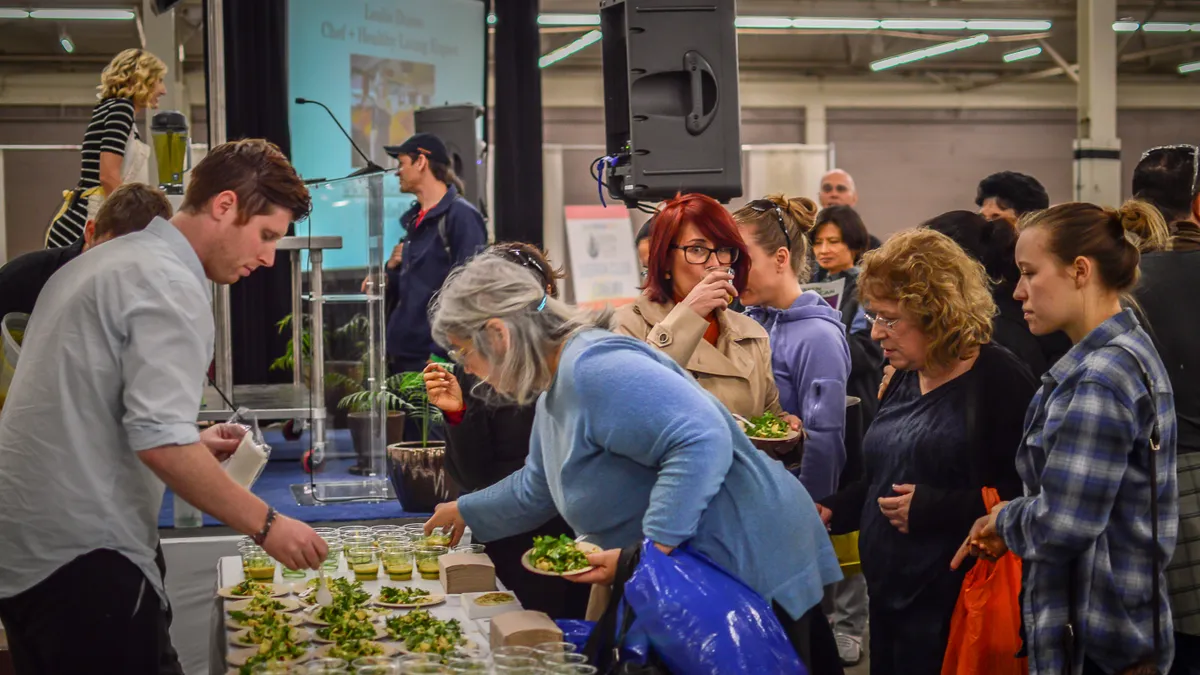For the eco-conscious entrepreneur and the sustainable consumer, there is an event that puts biodegradable seagrass caskets, electronic bikes, mercury-free bamboo watches, and more right at attendees' fingertips: Green Festival.
What started in 2002 as a grassroots marketplace for San Francisco's tree-hugging inventors to pedal their wares has burgeoned into a mega event—the largest in the US and recently acquired by Messe Stuttgart, producers of Europe’s even bigger consumer sustainability show.
With its simple name, the event draws big brands and not-so-known businesses from North America to the five cities where the events now occur. In between touching and trying eco-friendly merchandise, consumers take in workshops and films. The next opportunity for this showcase is this weekend, May 6-8, at the Convention Center in Washington, DC.
The New York show has just ended as Los Angeles, San Francisco, and Portland prepare for their next fall sustainability bashes.
"With about 300 exhibitors, partners, and sponsors and 15,000 to 25,000 consumers at every event, the Green Festival is meant to inspire and empower consumers, communities, and businesses to work, play, and live green," said Festival President Corinna Basler. This Festival's priorities are about upcycling, recycling, composting, and other ways to zero waste.
Basler told Waste Dive that this is an experiential platform with an educational component and businesses can bring out just about anything for consumers to explore — as long as the products are truly green, easily accessible, and affordable.
Taking brand recognition to the next level
"Rather than go from store to store, [event goers] can walk the show floor, ask exhibitors questions, try out different products, and leave with a bag full," said Basler. Beginning in July, exhibitors will be able to upload product information into an online store and sell year-round.
The event continues to recruit local organizations with one of its most recent partners and West Coast exhibitors being Global Footprint Network; their online tool allows consumers to measure their carbon footprint.
Vendors are nudged to take their product portfolio to the next level, and Green Festival helps them do it by offering certification through its partner and co-founder, Green America.
There is also a Green Festival Community Award: a $5,000 grant that goes to a nonprofit, voted on by the public. Candidates have included Trash for Teaching, which collects tossed manufacturers’ materials and turns them into school supplies. A recent first-prize winner, Cafeteria Culture, is leveraging the grant to expand its work in getting cafeterias to zero waste goals, as well as to finish a video series teaching children to waste less food.
Leading by a zero-waste example
The Green Festival events shoot for zero waste through recycling and composting, and through materials like 100% plant-based signs emblazoned in soy ink and compostable event guides. So far, Green Festival has reached 98% diversion from landfill.
The hosting convention centers all have anti-waste rules, too. The Portland-area venue has said "no" to foam signs, while New York’s LEED-certified Jacob Javits Convention Center flaunts a menu of green features, including its signature 6.75-acre green roof — the second largest of its kind in the country.
"As part of our focus on sustainability, we work closely with our events to explore ways to reduce energy consumption, recycle materials, and donate goods to local organizations," said Alan Steel, president and CEO of the corporation that operates the Javits Center. "Hosting Green Festival is a testament to our ability to attract a diverse portfolio of trade shows, conventions, and special events to New York."
A sneak peek
At this weekend's DC show, Jaclyn McDuffey of Emerald Brand will talk on "Taking the Fear Out of Sustainability: 3 Easy Steps to Greening Your Facility," while Green America Better Paper Project will discuss "The State of Recycling in the Region — What's working and NOT?"
The event also provides a business-to-business networking venue for small companies and startups looking to break into or expand into green industries.
Helping green businesses grow and impacting change
The Green Festival provides a platform where the demand for sustainable products is fed, while helping companies working toward turning a profit from such "experimental" designs. Nonprofits pay from $790 to exhibit for three days and private industry fees start at $1,200, depending on location.
"We like to blame government [for our environmental problems]. We like to blame companies and advertising. But we are ultimately responsible for own decisions, and we shape demand. If we create demand, companies will follow. They see there is a market—that they can increase their revenue," said Basler.













